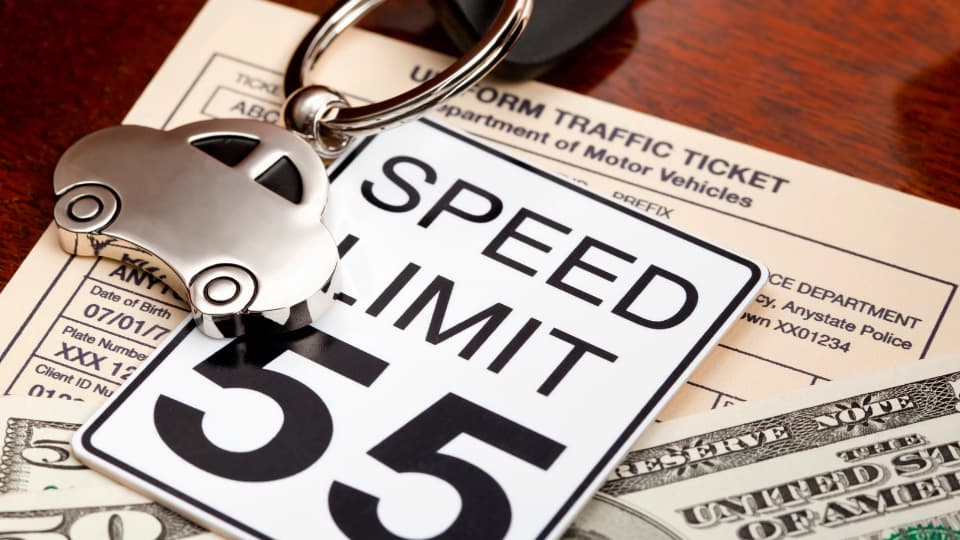Receiving a speeding ticket can be frustrating and stressful for any driver. It can result in fines, points on your driving record, and potentially higher insurance rates. Understanding the duration of a speeding ticket on your record is essential for planning and preventing any long-term consequences.

In New Jersey, speeding tickets are taken seriously, and they can impact your driving record and insurance rates for a considerable amount of time. This article will delve into the details of how long a speeding ticket stays on your record in New Jersey, what the consequences of accumulating points are, and what steps you can take to mitigate the impact on your driving record and insurance rates.
So We highly suggest you to visit the official website url of njmcdirect by typing : www.njmcdirect.com en español in spanish & english can be used.
How Long Does a Speeding Ticket Stay on Your Record in New Jersey?
Firstly, it is crucial to define what a speeding ticket is. A speeding ticket is a traffic violation that occurs when a driver exceeds the posted speed limit on a road. Speeding tickets can be issued to drivers for various reasons, such as speeding in a school zone, construction zone, or residential area. There are different types of speeding violations in New Jersey, including the following:
- Exceeding the posted speed limit by less than 10 mph: This is considered a minor violation and carries a fine of up to $54.
- Exceeding the posted speed limit by 10-20 mph: This is considered a moderate violation and carries a fine of up to $81.
- Exceeding the posted speed limit by 21-30 mph: This is considered a major violation and carries a fine of up to $135.
- Exceeding the posted speed limit by 31 mph or more: This is considered a severe violation and carries a fine of up to $540.
New Jersey’s Point System
In addition to the fines imposed for speeding tickets, New Jersey also operates on a point system for traffic violations. Each violation is assigned a certain number of points, and these points remain on your driving record for a specific duration. The number of points assigned for speeding violations in New Jersey depends on the severity of the violation:
- Exceeding the posted speed limit by less than 10 mph: This carries no points.
- Exceeding the posted speed limit by 10-14 mph: This carries two points.
- Exceeding the posted speed limit by 15-29 mph: This carries four points.
- Exceeding the posted speed limit by 30 mph or more: This carries five points.
Consequences of Accumulating Points Accumulating points on your driving record can have various consequences, such as the following:
- Higher insurance rates: Insurance companies often review driving records and may increase premiums for drivers with multiple violations or points.
- License suspension: If a driver accumulates 12 or more points within a two-year period, their driver’s license can be suspended.
- Fines: Accumulating points can result in additional fines, depending on the number of points and the type of violation.
Duration of a Speeding Ticket on Your Record Now that we understand how points are assigned for speeding tickets in New Jersey, we can explore how long they remain on your record. In general, speeding tickets remain on your driving record for five years in New Jersey. However, this duration can vary depending on various factors such as the following:
- The severity of the violation: The duration of the ticket on your record can vary based on the severity of the violation. For example, a severe speeding ticket may remain on your record for longer than a minor speeding ticket.
- Your driving history: If you have a history of traffic violations, the duration of the ticket on your record may be longer.
- Your insurance company’s policies: Insurance companies often review driving records and may consider violations and points for a longer duration than the state requires. This can result in higher insurance rates for a more extended period.
Examples of Specific Speeding Violations and their Corresponding Record Durations To give you a better idea of how long a speeding ticket can stay on your driving record in New Jersey, here are a few examples:
- Exceeding the posted speed limit by less than 10 mph: This violation carries no points and will not appear on your driving record.
- Exceeding the posted speed limit by 10-14 mph: This violation carries two points and will remain on your driving record for five years.
- Exceeding the posted speed limit by 15-29 mph: This violation carries four points and will remain on your driving record for five years.
- Exceeding the posted speed limit by 30 mph or more: This violation carries five points and will remain on your driving record for five years.
Impact on Insurance Rates
Speeding tickets can have a significant impact on your auto insurance premiums. Insurance companies often view drivers with traffic violations as a higher risk and may charge higher rates as a result. The duration of a speeding ticket on your driving record can also impact your insurance rates.
In New Jersey, insurance companies are allowed to consider driving record information for the past three years when determining insurance premiums. However, some insurance companies may review driving records for longer periods and may consider violations and points beyond the state’s required duration.
Strategies to Mitigate the Impact on Insurance Rates
There are several strategies you can use to mitigate the impact of a speeding ticket on your insurance rates:
- Shop around for insurance: Different insurance companies may have different policies regarding violations and points, so it may be worth shopping around to find the best rates.
- Take a defensive driving course: Completing a defensive driving course can show your insurance company that you are committed to safe driving and may result in a discount on your insurance rates.
- Request expungement: If you are eligible, you can request to have a speeding ticket removed from your driving record. This can help reduce the impact on your insurance rates.
Expungement and Record Removal
If you want to remove a speeding ticket from your driving record, you may be eligible for expungement. In New Jersey, you can request expungement if:
- It has been at least five years since the violation occurred, and you have not received any other violations or suspensions during that time.
- You have no more than three points on your driving record.
- You have not been convicted of a DUI or other serious traffic violation.
The process of requesting expungement involves submitting a request to the New Jersey Motor Vehicle Commission (MVC). If approved, the ticket will be removed from your driving record, and the associated points will be removed as well.
Benefits and Limitations of Expunging a Speeding Ticket
Expunging a speeding ticket can have several benefits, such as the following:
- Reduced insurance rates: Removing a speeding ticket from your driving record can help lower your insurance rates.
- Improved job prospects: Certain jobs may require a clean driving record, and expunging a speeding ticket can help improve your chances of being hired.
However, it is important to note that expunging a speeding ticket does not erase the violation from your driving history entirely. Law enforcement agencies and the courts may still be able to access the information, and the violation may be considered if you receive future violations.
How to Handle a Speeding Ticket in New Jersey
If you receive a speeding ticket in New Jersey, there are several steps you can take to handle the situation:
- Accept the ticket and pay the fine: The first option is to accept the ticket and pay the fine. By doing so, you are admitting guilt for the violation, and the associated points will appear on your driving record. The amount of the fine depends on the severity of the violation and can range from a few hundred dollars to over a thousand dollars. Additionally, depending on the severity of the violation, you may be required to appear in court.
- Contest the ticket in court: If you believe that the ticket was issued in error, you have the option to contest the violation in court. To do so, you will need to appear in court on the designated date and present your case to a judge. The judge will hear your argument and evidence and make a decision based on the facts presented.
- Hire a traffic attorney: If you are facing significant fines, points, or the possibility of license suspension, you may want to consider hiring a traffic attorney to represent you in court. A traffic attorney can advise you on your options, represent you in court, and negotiate on your behalf to reduce the fines and points associated with the violation.
- Attend a defensive driving course: In some cases, attending a defensive driving course can help mitigate the impact of a speeding ticket on your driving record. If you successfully complete an approved course, you may be eligible to have points removed from your record. Additionally, some insurance companies offer discounts to drivers who complete a defensive driving course.
- Request expungement: If the violation resulted in points on your driving record, you may be eligible to have the points expunged after a certain period of time. The duration of time before the points can be expunged depends on the severity of the violation. For example, a minor violation may be eligible for expungement after two years, while a more severe violation may require five years or longer.
Additionally, it is essential to emphasize the importance of obeying traffic laws and practicing safe driving habits. By adhering to speed limits and being mindful of road conditions, you can reduce the likelihood of receiving a speeding ticket and maintain a clean driving record.
Furthermore, it is worth noting that the information provided in this article is based on the current traffic violation system in New Jersey as of my knowledge cutoff in September 2021. It is always advisable to consult the latest regulations and guidelines from the relevant authorities or seek legal advice for the most up-to-date and accurate information regarding speeding tickets and their impact on your driving record in New Jersey.
In conclusion, understanding the duration of a speeding ticket on your record in New Jersey is crucial for planning and managing any potential consequences. By being aware of the point system, the impact on insurance rates, and the option of expungement, you can make informed decisions and take appropriate actions to minimize the long-term effects of a speeding ticket. Remember, responsible driving and compliance with traffic laws are the best ways to avoid speeding tickets and maintain a clean driving record.
